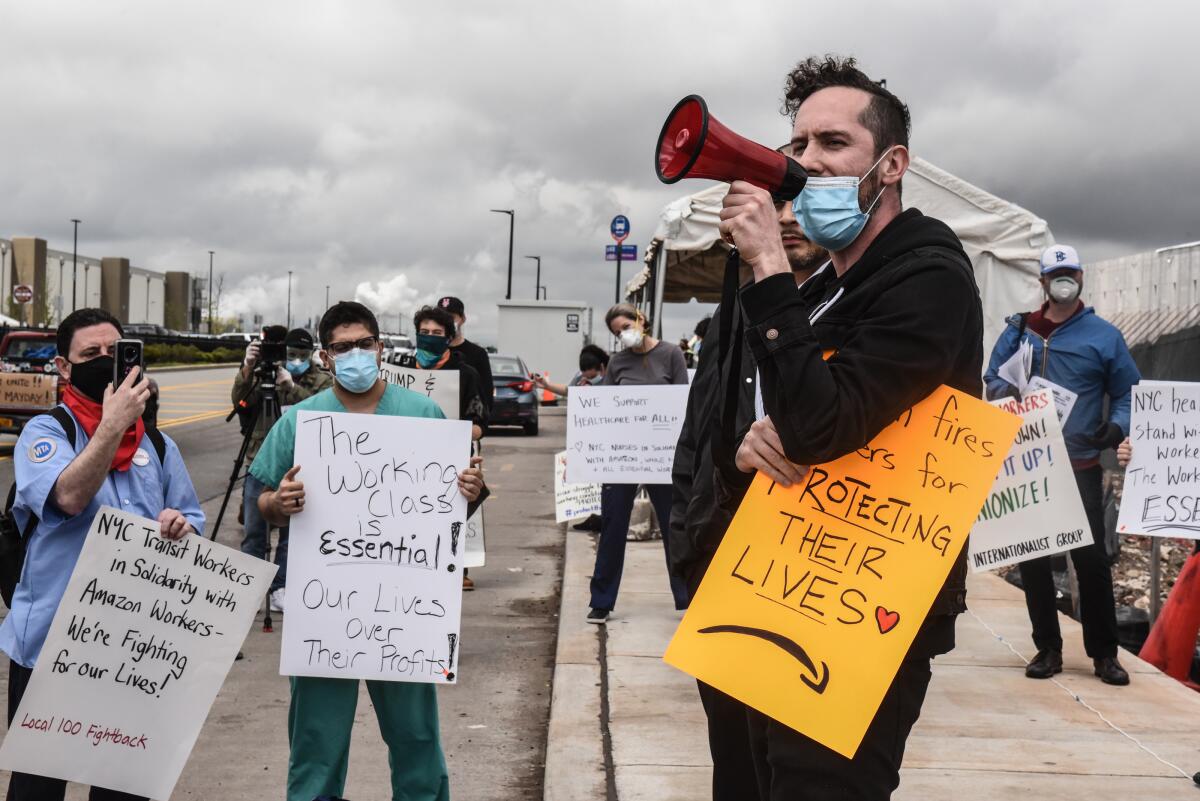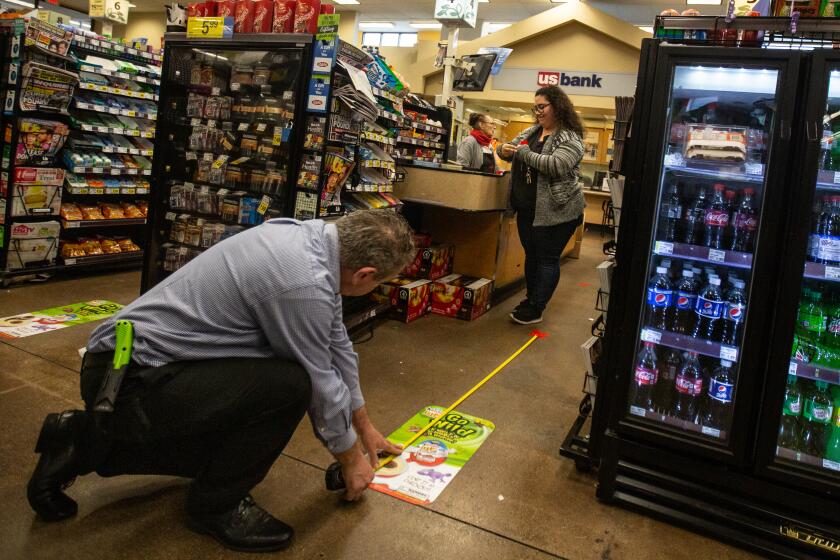Amazon unit’s VP resigns to protest firings of coronavirus ‘whistleblowers’

- Share via
A vice president in Amazon.com Inc.’s cloud computing division has resigned in protest over the company’s firing of staffers who had raised concerns about worker safety at the online retailer’s warehouses during the coronavirus crisis.
Tim Bray, who worked at Amazon Web Services, said Monday that he had stepped down from his role as vice president and distinguished engineer after having “escalated [concerns] through the proper channels and by the book.”
“I quit in dismay at Amazon firing whistleblowers who were making noise about warehouse employees frightened of Covid-19,” he said in an open letter on his website.
Amazon said it had no comment on the matter.
From Cal/OSHA complaints to uniting with unions, workers can take some action if they feel their workplaces aren’t keeping them safe during the coronavirus pandemic.
Ferocious demand for online shopping during the pandemic has prompted Amazon to hire 175,000 new warehouse workers in just under two months, but Amazon has been accused of putting employees in danger by not slowing down the pace of their work or providing them with adequate protective equipment.
Surging sales have also come at a high cost. Last week the company warned that it expected to spend $4 billion on coronavirus-related charges in the second quarter of the year.
But many still argue that the company has not done enough. In Italy, workers have gone on strike at several distribution centers in the north of the country, protesting what they described as unsafe working conditions and lack of information about infected colleagues.
Just over a week ago, the French government ordered Amazon to ship only “essential” items until the company could ensure sufficient health and safety measures were introduced in warehouses.
Some Amazon drivers resent seeing friends and family urged to stay at home while they are being told to crisscross town at their own peril.
In the United States, Amazon has fired several workers who were behind protests and walkouts organized to draw attention to concerns over staff safety.
Chris Smalls, who in March organized a walkout at an Amazon fulfillment center in New York, was fired by Amazon for what the company described as “violating social distancing guidelines and putting the safety of others at risk.”
The company has since also laid off white-collar office workers who have voiced concerns about their roughly 1 million colleagues working in Amazon warehouses.
Bray has contributed to the development of several well-used technology standards, including the markup language XML. In his note, he said user experience designers Emily Cunningham and Maren Costa, who were members of an internal climate change activist group, were fired after organizing a video call featuring warehouse workers from around the world, including “guest activist Naomi Klein.”
“The justifications [for their dismissal] were laughable; it was clear to any reasonable observer that they were turfed for whistleblowing,” Bray said.
He also noted the personal loss he would incur as a result of his resignation. “What with big-tech salaries and share vestings, this will probably cost me over a million [pre-tax] dollars, not to mention the best job I’ve ever had, working with awfully good people,” he said. “So I’m pretty blue.”
Bray joined Amazon’s Vancouver, Canada, office in 2014 and worked on its so-called serverless architecture, which allows companies to build and run applications on Amazon’s cloud servers. He was previously employed by Google, and contributed to developing the encryption service OpenKeychain used across the Google-backed Android mobile operating system.
Bray has been outspoken on issues of social and environmental justice in the past. In 2018, he was arrested after protesting Canada’s controversial Trans Mountain oil pipeline, and last year he was one of 8,702 signatories of an open letter calling for action from Amazon on climate change.
Christy Hoffman, general secretary of international federation UNI Global Union, said criticism of Amazon’s treatment of workers in its warehouses was affecting the company’s ability to retain tech talent.
“Many people came to Amazon to make the world a better place, and now you see top leaders saying that the company does not share that mission,” she said.
Amazon Chief Executive Jeff Bezos, whom Forbes lists as the world’s richest person, was on Friday notified by the House Judiciary Committee that the antitrust panel wants him to testify after allegations that Amazon had misled Congress over whether it used data from third-party sellers to promote and sell its own goods.
In his open letter, Bray contrasted the working conditions of warehouse workers who “are getting weaker with mass unemployment and [in the U.S.] job-linked health insurance” versus employees working at Amazon’s offices.
Amazon Web Services, he said, “is a different story. … Its workers have power. The average pay is very high, and anyone who’s unhappy can walk across the street and get another job paying the same or better.”
© The Financial Times Limited 2020. All Rights Reserved. FT and Financial Times are trademarks of the Financial Times Ltd. Not to be redistributed, copied or modified in any way.







